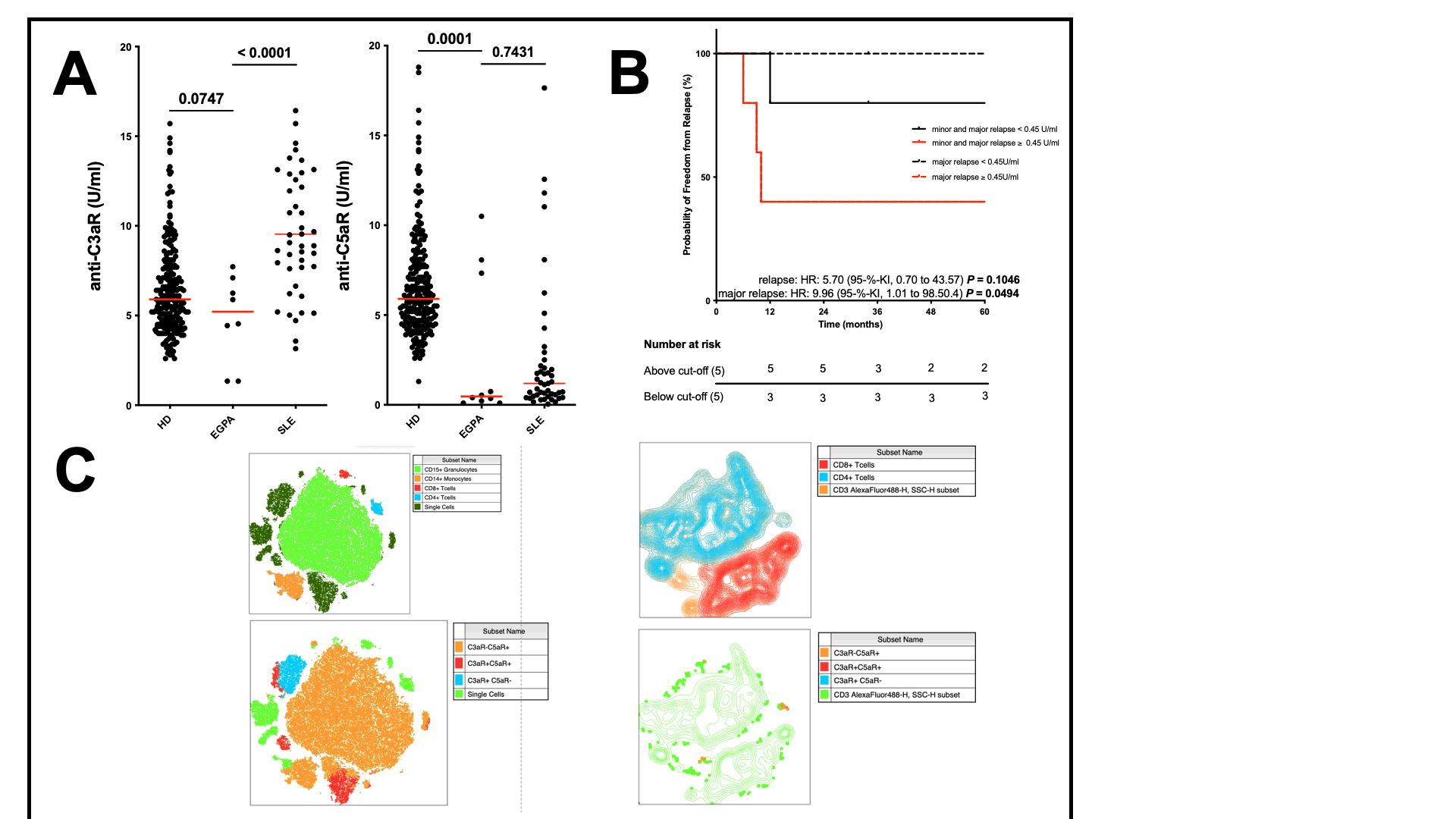Session Information
Session Type: Poster Session B
Session Time: 10:30AM-12:30PM
Background/Purpose: Complement activation has been shown to play an important role in the pathogenesis of the two major anti-neutrophil cytoplasmic autoantibody (ANCA)-associated vasculitis (AAV) variants, granulomatosis with polyangiitis (GPA) and microscopic polyangiitis (MPA) [1,2]. The glucocorticoid-sparing oral C5aR antagonist avacopan improves disease control and recovery of renal function in GPA and MPA [3,4]. A recent study showed concentrations of endogenous antibodies against G-protein coupled receptors (GPCR) targeting C3a and C5a complement receptors (anti-C3aR- and anti-C5aR aabs) were decreased and anti-C5aR aabs concentrations associated with disease activity and early relapse in GPA and MPA suggestive of C5aR as novel immune checkpoint in AAV [5]. As yet, anti-C3aR and C5aR aabs have not been evaluated in eosinophilic granulomatosis with polyangiitis (EGPA). The present study aimed to examine the correlation of anti-C3aR and C5aR aabs with clinical findings and outcomes in EGPA.
Methods: To determine circulating anti-C3aR and C5aR aabs concentrations and analyze their diagnostic and/or prognostic value, sera in patients with EGPA (n = 10), systemic lupus erythematosus as disease control (SLE, n =47) and healthy donors (HD, n = 220). Anti-C3aR and C5aR aabs were determined by ELISA (CellTrend GmbH, Luckenwalde, Germany). C3aR and C5aR expression by circulating granulocytes, monocytes and T cells was analyzed using flow cytometry as described previously [5]. Clinical data including vasculitis scores BVAS V3.0 and VDI, inflammatory markers, PR3- and MPO-ANCA and treatment were assessed at the time of serum sampling and during follow-up for 60 months.
Results: In EGPA, anti-C3aR and anti-C5aR antibody concentrations were decreased compared to HD (anti-C3aR aabs: EGPA vs. HD: 4.82 U/ml±2.43 vs. 6.49 U/ml±2.59, P = 0.074; anti-C5aR aabs: 2.84 U/ml±4.08 vs. 6.25 U/ml±2.91, P = 0.0001, figure 1A) and SLE (anti-C3aR aabs: EGPA vs. SLE: 4.82 U/ml±2.43 vs. 11.92 U/ml±8.20, P < 0.0001; anti-C5aR aabs: 2.84 U/ml±4.08 vs. 3.01 U/ml±10.05, P = 0.743, figure 1A). In contrast to anti-C3aR aabs, decreased concentrations of anti-C5aR aabs were associated with major relapse in EGPA (HR: 9.96, P = 0.0494, figure 1B). Circulating CD4 and CD8 positive T cells were predominantly C5aR positive but C3aR negative (figure 1C).
Conclusion: Low concentrations of circulating anti-C5aR aabs reflect an increased risk for relapse in EGPA, comparable to that previously reported in GPA and MPA [5].
References:
1. Arnold S et al. Lancet Rheumatol. 2024
2. Falde SD et al. Lancet Rheumatol. 2024
3. Jayne DRW et al. N Engl J Med 2021
4. Cortazar FB et al. Kidney Int Rep. 2023
5. Klapa S et al. Arthritis Rheumatol. 2023
To cite this abstract in AMA style:
Klapa S, Arnold S, Müller A, Koch A, Staehle A, Kähler W, Heidecke H, Riemekasten G, Lamprecht P. Low Concentrations of Anti-C5a Complement Receptor Antibodies Are Associated with Relapse in Eosinophilic Granulomatosis with Polyangiitis (EGPA) [abstract]. Arthritis Rheumatol. 2024; 76 (suppl 9). https://acrabstracts.org/abstract/low-concentrations-of-anti-c5a-complement-receptor-antibodies-are-associated-with-relapse-in-eosinophilic-granulomatosis-with-polyangiitis-egpa/. Accessed .« Back to ACR Convergence 2024
ACR Meeting Abstracts - https://acrabstracts.org/abstract/low-concentrations-of-anti-c5a-complement-receptor-antibodies-are-associated-with-relapse-in-eosinophilic-granulomatosis-with-polyangiitis-egpa/

